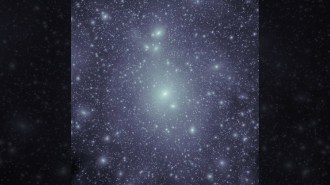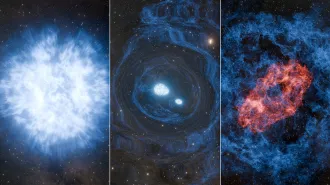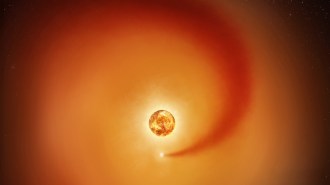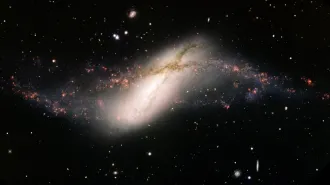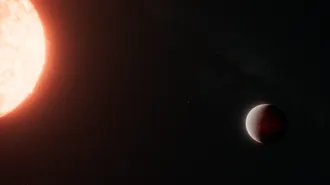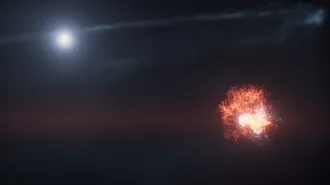
A broken cable damaged the Arecibo Observatory’s 305-meter-wide dish in August, shown here. A second cable broke in November, prompting the observatory to close permanently over safety concerns.
UCF/AO
- More than 2 years ago
Read another version of this article at Science News Explores
Arecibo’s days are done. After two support cables failed in recent months, the radio observatory’s 305-meter-wide dish is damaged beyond repair, the National Science Foundation announced on November 19. It will be decommissioned and dismantled.
“It’s a death in the family,” says astronomer Martha Haynes of Cornell University, who has used the telescope in Puerto Rico to study hydrogen in the universe since she was fresh out of college in 1973. “For those of us who use Arecibo and had hoped to use it in the future, it’s a disaster.”
The telescope, famous for appearances in movies like GoldenEye and Contact, consists of a wide dish to collect radio waves from space and focus them into detectors housed in a dome suspended above the dish. In August, one of the cables that holds up the dome slipped out of a socket and punched a hole in the dish.
The NSF and the University of Central Florida, which manages the telescope, had plans to repair the cable, Haynes said. But then a second cable unexpectedly broke on November 6. If a third cable were to break, it could send the platform holding up the dome swinging, or the whole structure could collapse.
The NSF determined that there was no safe way to repair the telescope, the agency announced on November 19.
“Until these assessments came in, our question was not if the observatory should be repaired but how,” said Ralph Gaume, director of NSF’s Division of Astronomical Sciences, in a statement. “But in the end, a preponderance of data showed that we simply could not do this safely. And that is a line we cannot cross.”
The closure is the last in a series of near disasters for Arecibo. A different cable was damaged in an earthquake in 2014. Repairs on that cable were delayed by Hurricane Maria in 2017, which temporarily shut down the observatory as Puerto Rico weathered widespread power outages and humanitarian crises (SN: 9/29/17). And the observatory has been the victim of threatened or actual budget cuts for years (SN: 11/17/17).
But its loss is a major blow for astronomy. Built in 1963, Arecibo was one of the best facilities in the world for observations ranging from mysterious blasts of radio waves from deep space (SN: 2/7/20) to tracking near-Earth asteroids that could potentially crash into our planet (SN: 1/20/20). It also was used in the early days of the search for extraterrestrial intelligence, or SETI (SN: 5/29/12).
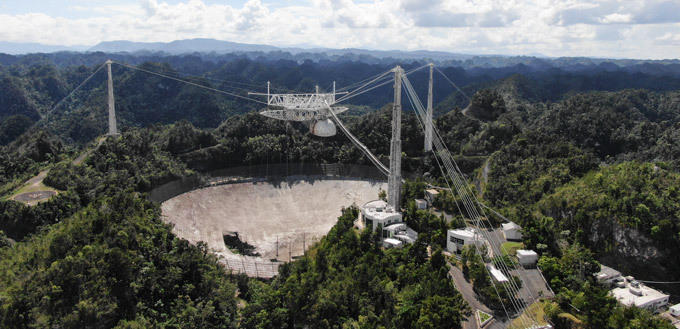
“Astronomers don’t have a lot of facilities,” Haynes says. Each new one is designed to have unique advantages over existing telescopes. “So when you lose one, it’s gone.”
The observatory’s end is also a symbolic and practical loss for Puerto Rico, says radio astronomy researcher Kevin Ortiz Ceballos, a senior at the University of Puerto Rico at Arecibo who used the observatory to study the first known interstellar comet and stars that host exoplanets (SN: 10/14/19).
“Arecibo is like an icon of Puerto Rican science,” he says. “This is absolutely devastating.”
Ortiz Ceballos grew up watching Puerto Rican cartoons in which the characters went to Arecibo to use the telescope. His parents drove him an hour and a half to visit the telescope. He credits it with sparking his interest in astronomy, and he had hoped to come back to Puerto Rico to work at Arecibo after completing his Ph.D.
“Puerto Rico has a huge mass emigration problem,” he says. “It’s a lot of people, and they’re all my age. It’s a huge brain drain. Being able to do what I love without having to leave, it was a huge dream for me.”
And not just him, he notes: Dozens of students at the university and the observatory, plus more than 200 Puerto Rican students who went through the observatory’s high school program, have a similar story.
“Losing this, especially after all that we’ve lost over the past half decade, makes me feel like we’re condemned to have our country just be ruins,” he says. “It becomes a signifier of a broader collapse. That’s just really tragic.”

